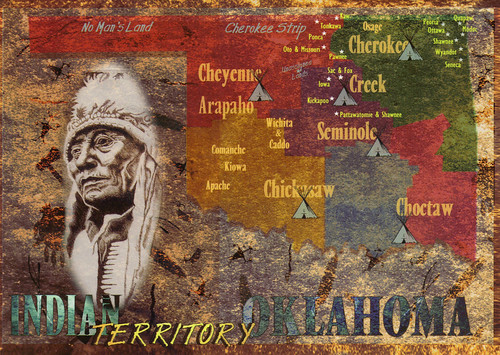She'll turn softly and call my name out low
And she'll cry just to think I'd really leave her
Though time and time I tried to tell her so..."
- 'By the Time I Get to Phoenix',
Glen Campbell
We are only 24 hours from Tulsa, so let's continue on down Route 66 and figure out what we know of Oklahoma.
It is somewhat appropriate (even if I do say so myself) that I use a lyric by Glen Campbell above, as we have already been to Oklahoma in the company of Mr. Campbell in the film True Grit. In that movie Glen accompanied John Wayne's Marshal Rooster Cogburn over the border from the (relative) tranquility of Arkansas into the lawless Indian Territory. The history of the American Indians in what is now Oklahoma is a tragic one. As the United States began to step up its colonisation of the land beyond the Appalachian Mountains the indigenous inhabitants were uprooted at gun point and forced off thei land. The Choctaw and Cherokee were marched, with great loss of life, all the way from eastern Tennessee along the 'Trail of Tears' to Oklahoma. Here they were resettled. Of course, there were other Indian peoples already living in this territory. By 1890 more than thirty different Indian nations and tribes had been concentrated into this area. But eastern Oklahoma held good as a land for Native Americans. Until the 1880s anyway. From that point onward the U.S. Government started sequestering land away from the natives. Vast swathes would be opened up for settlers; colonists would line up on border until an appointed hour, and then sprint into the newly-opened up territory to grab what land they could. Of course, some managed to sneak across the line sooner, hence Oklahoma's nickname of the 'The Sooner State'. The Indian nations, uprooted once before, were uprooted yet again. Looking on a map of Oklahoma I couldn't help but notice that the state looks like a bloody cleaver.
It is tempting to see the desertification of the Dust Bowl in the 1930s as the revenge of the Indians. The impoverished 'Okie' farmers were forced into an itinerant life to find work, as depicted in John Steinbeck's 'The Grapes of Wrath'. But these days Oklahoma's wealth comes not from what can be grown upon the land, but what lies below it: oil and gas.
I suppose when I think of Oklahoma, however, two things really spring to mind. The first is 1995's Oklahoma City Bombing, a protest against government. The second is the Rodgers and Hammerstein musical Oklahoma! The film version, of course, had to make my list of three films set in the state. I'm hoping to see oil, evangelicals, tornadoes, the dust bowl and Indians this week. Whether I will or not, I don't know. But I think the tornadoes are pretty much guaranteed considering that my three films are:
- Twister (1996)
- Rumble Fish (1983)
- Oklahoma (1955)

No comments:
Post a Comment